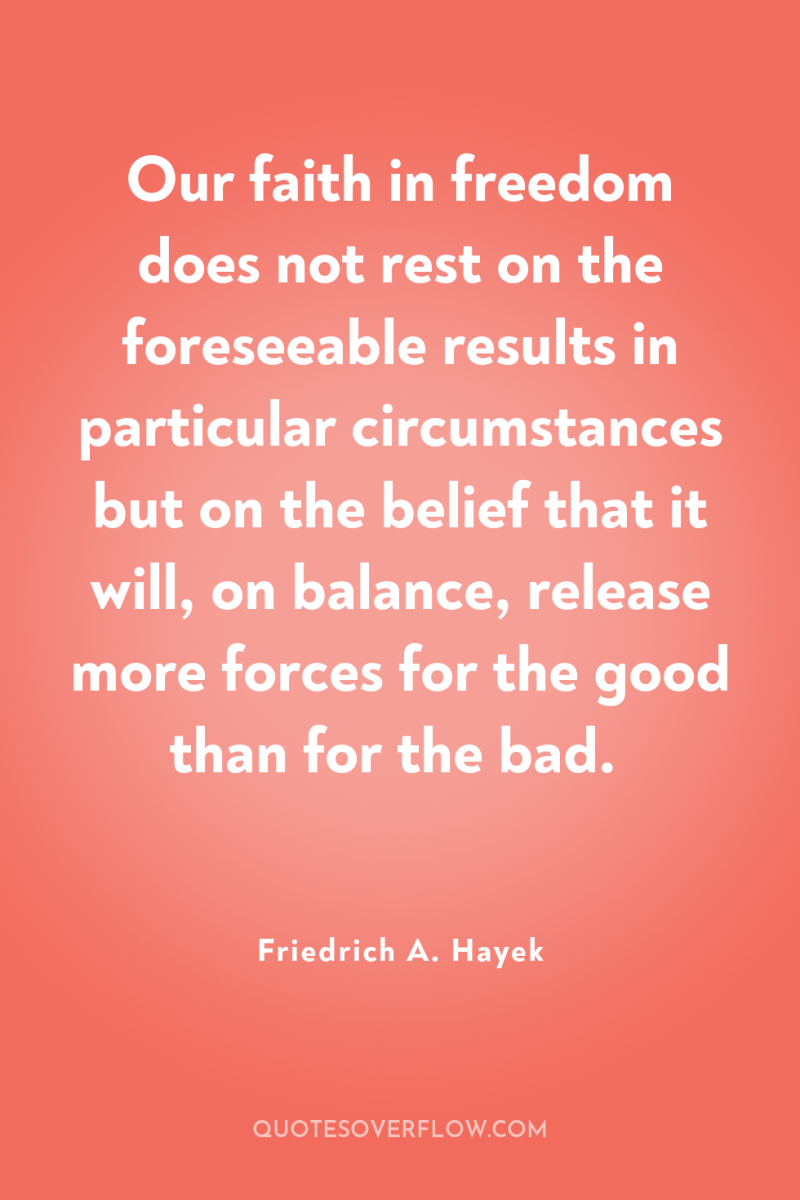
Man does not know most of the rules on which he acts and even what we call his intelligence is largely a system of rules which operate on him but which he does not know.Friedrich A. Hayek

Our faith in freedom does not rest on the foreseeable results in particular circumstances but on the belief that it will, on balance, release more forces for the good than for the bad.Friedrich A. Hayek
It is because every individual knows little and, in particular, because we rarely know which of us knows best best that we trust the independent and competitive efforts of many to induce the emergence of what we shall want when we see it.Friedrich A. Hayek

Freedom necessarily means that many things will be done which we do not like.Friedrich A. Hayek

I was quite depressed two weeks ago when I spent an afternoon at Brentano's Bookshop in New York and was looking at the kind of books most people read. Once you see that you lose all hope.Friedrich A. Hayek
All political theories assume, of course, that most individuals are very ignorant. Those who plead for liberty differ from the rest in that they include among the ignorant themselves as well as the wisest. Compared with the totality of knowledge which is continually utilized in the evolution of a dynamic civilization, the difference between the knowledge that the wisest and that the most ignorant individual can deliberately employ is comparatively insignificant.Friedrich A. Hayek
The mind can never foresee its own advanceFriedrich A. Hayek
If we can agree that the economic problem of society is mainly one of rapid adaptation to changes in the particular circumstances of time and place, it would seem to follow that the ultimate decisions must be left to the people who are familiar with these circumstances, who know directly of the relevant changes and of the resources immediately available to meet them.Friedrich A. Hayek
To act on the belief that we possess the knowledge and the power which enable us to shape the processes of society entirely to our liking, knowledge which in fact we do not possess, is likely to make us do much harm.Friedrich A. Hayek
It seems to be almost a law of human nature that it is easier for people to agree on a negative programme, on the hatred of an enemy, on the envy of those better off, than on any positive task. The contrast between the "we" and the "they", the common fight against those outside the group, seems to be an essential ingredient in any creed which will solidly knit together a group for common action. It is consequently always employed by those who seek, not merely support of a policy, but the unreserved allegiance of huge masses. From their point of view it has the great advantage of leaving them greater freedom of action than almost any positive programme. .Friedrich A. Hayek
The most effective way of making people accept the validity of the values they are to serve is to persuade them that they are really the same as those which they, or at least the best among them, have always held, but which were not properly understood or recognised before.Friedrich A. Hayek
The principle that the end justifies the means is in individualist ethics regarded as the denial of all morals. In collectivist ethics it becomes necessarily the supreme rule.Friedrich A. Hayek
It seems to be almost a law of human nature, that it is easier for people to agree on a negative programme, on the hatred of an enemy, on the envy of those better off, than on any positive task. The contrast between the “we” and the “they, ” the common fight against those outside the group, seems to be an essential ingredient in any creed which will solidly knit together a group for common action. It is consequently always employed by those who seek, not merely support of a policy, but the unreserved allegiance of huge masses. From their point of view it has the great advantage of leaving them greater freedom of action than almost any positive programme. .Friedrich A. Hayek
Emergencies” have always been the pretext on which the safeguards of individual liberty have been eroded.Friedrich A. Hayek
It is beÂcause freedom means the renunÂciation of direct control of individual efforts that a free society can make use of so much more knowledge than the mind of the wisest ruler could comprehend.Friedrich A. Hayek
When individuals combine in a joint effort to realize ends the have in common, the organizations, like the state, that they form for this purpose are given their own system of ends and their own means. But any organization thus formed remains one "person" among other, in the case of the state much more powerful than any of the others, it is true, yet still with its separate and limited sphere in which alone its ends are supreme.Friedrich A. Hayek
There will always exist inequalities which will appear unjust to those who suffer from them, disappointments which will appear unmerited, and strokes of misfortune which those hit have not deserved. But when these things occur in a society which is consciously directed, the way in which people will react will be very different from what it is when they are nobody's conscious choice.Friedrich A. Hayek
The great misfortune of our generation is that the direction which by the amazing progress of the natural sciences has been given to its interests is not one which assists us in comprehending the larger process of which as individuals we form merely a part or in appreciating how we constantly contribute to a common effort without either directing it or submitting to orders of others.Friedrich A. Hayek
Emergencies” have always been the pretext on which the safeguards of individual liberty have eroded.Friedrich A. Hayek
The disdain of profit is due to ignorance, and to an attitude that we may if we wish admire in the ascetic who has chosen to be content with a small share of the riches of this world, but which, when actualised in the form of restrictions on profits of others, is selfish to the extent that it imposes asceticism, and indeed deprivations of all sorts, on others.Friedrich A. Hayek
It is true that the virtues which are less esteemed and practiced now--independence, self-reliance, and the willingness to bear risks, the readiness to back one's own conviction against a majority, and the willingness to voluntary cooperation with one's neighbors--are essentially those on which the of an individualist society rests. Collectivism has nothing to put in their place, and in so far as it already has destroyed then it has left a void filled by nothing but the demand for obedience and the compulsion of the individual to what is collectively decided to be good.Friedrich A. Hayek
Freedom to order our own conduct in the sphere where material circumstances force a choice upon us, and responsibility for the arrangement of our own life according to our own conscience, is the air in which alone moral sense grows and in which moral values are daily recreated in the free decision of the individual. Responsibility, not to a superior, but to one's own conscience, the awareness of a duty not exacted by compulsion, the necessity to decide which of the things one values are to be sacrificed to others, and to bear the consequences of one's own decision, are the very essence of any morals which deserve the name.Friedrich A. Hayek
The word 'truth' itself ceases to have its old meaning. It describes no longer something to be found, with the individual conscience as the sole arbiter of whether in any particular instance the evidence (or the standing of those proclaiming it) warrants a belief; it becomes something to be laid down by authority, something which has to believed in the interest of unity of the organized effort and which may have to be altered as the exigencies of this organized effort require it.Friedrich A. Hayek
Probably it is true enough that the great majority are rarely capable of thinking independently, that on most questions they accept views which they find ready-made, and that they will be equally content if born or coaxed into one set of beliefs or another. In any society freedom of thought will probably be of direct significance only for a small minority. But this does not mean that anyone is competent, or ought to have power, to select those to whom this freedom is to be reserved. It certainly does not justify the presumption of any group of people to claim the right to determine what people ought to think or believe. .Friedrich A. Hayek
It is one of the saddest spectacles of our time to see a great democratic movement support a policy which must lead to the destruction of democracy and which meanwhile can benefit only a minority of the masses who support it. Yet it is this support from the Left of the tendencies toward monopoly which make them so irresistible and the prospects of the future so dark.Friedrich A. Hayek
Everything which might cause doubt about the wisdom of the government or create discontent will be kept from the people. The basis of unfavorable comparisons with elsewhere, the knowledge of possible alternatives to the course actually taken, information which might suggest failure on the part of the government to live up to its promises or to take advantage of opportunities to improve conditions--all will be suppressed. There is consequently no field where the systematic control of information will not be practiced and uniformity of views not enforced.Friedrich A. Hayek
It is not difficult to deprive the great majority of independent thought. But the minority who will retain an inclination to criticize must also be silenced.. Public criticism or even expressions of doubt must be suppressed because they tend to weaken pubic support.. When the doubt or fear expressed concerns not the success of a particular enterprise but of the whole social plan, it must be treated even more as sabotage. .Friedrich A. Hayek
The theories of the social sciences do not consist of “laws” in the sense of empirical rules about the behavior of objects definable in physical terms. All that the theory of the social sciences attempts is to provide a technique of reasoning which assists us in connecting individual facts, but which, like logic or mathematics, is not about the facts. It can, therefore, and this is the second point, never be verified or falsified by reference to facts.Friedrich A. Hayek
Once you admit that the individual is merely a means to serve the ends of the higher entity called society or the nation, most of those features of totalitarian regimes which horrify us follow of necessity. From the collectivist standpoint intolerance and brutal suppression of dissent, the complete disregard of the life and happiness of the individual, are essential and unavoidable consequences of this basic premise, and the collectivist can admit this and at the same time claim that his system is superior to one in which the "selfish" interests of the individual are allowed to obstruct the full realisation of the ends the community pursues.Friedrich A. Hayek
When security is understood in too absolute a sense, the general striving for it, far from increasing the chances of freedom, becomes the gravestthreat to it.Friedrich A. Hayek
Economic control is not merely control of a sector of human life which can be separated from the rest; it is the control of the means for all our ends. And whoever has sole control of the means must also determine which ends are to be served, which values are to be rated higher and which lower, in short, what men should believe and strive for.Friedrich A. Hayek
In the first instance, it is probably true that in general the higher the education and intelligence of individuals becomes, the more their views and tastes are differentiated and the less likely they are to agree on a particular hierarchy of values. It is a corollary of this that if we wish to find a high degree of uniformity and similarity of outlook, we have to descend to the regions of lower moral and intellectual standards where the more primitive and "common" instincts and tastes prevail. This does not mean that the majority of people have low moral standards; it merely means that the largest group of people whose values are very similar are the people with low standards. It is, as it were, the lowest common denominator which unites the largest number of people. If a numerous group is needed, strong enough to impose their views on the values of life on all the rest, it will never be those with highly differentiated and developed tastes -it will be those who form the "mass" in the derogatory sense of the term, the least original and independent, who will be able to put the weight of their numbers behind their particular ideals.Friedrich A. Hayek
What is called economic power, while it can be an instrument of coercion, is in the hands of private individuals never exclusive or complete power, never power over the whole life of a person. But centralised as an instrument of political power it creates a degree of dependence scarcely distinguishable from slavery.Friedrich A. Hayek
The curious task of economics is to demonstrate to men how little they really know about what they imagine they can design. To the naive mind that can conceive of order only as the product of deliberate arrangement, it may seem absurd that in complex conditions order, and adaptation to the unknown, can be achieved more effectively by decentralizing decisions and that a division of authority will actually extend the possibility of overall order. Yet that decentralization actually leads to more information being taken into account.Friedrich A. Hayek
The young are right if they have little confidence in the ideas which rule most of their elders. But they are mistaken or misled when they believe that these are still the liberal ideas of the nineteenth century, which, in fact, the younger generation hardly knows. We have little right to feel in this respect superior to our grandfathers; and we should never forget that it is we, the twentieth century, and not they, who have made a mess of things. If in the first attempt to create a world of free men we have failed, we must try again. The guiding principle that a policy of freedom for the individual is the only truly progressive policy remains as true today as it was in the nineteenth century.Friedrich A. Hayek
The main cause of the ineffectiveness of British propaganda is that those directing it seem to have lost their own belief in the peculiar values of English civilization or to be completely ignorant of the main points on which it differs from that of other people. The Left intelligentsia indeed, have so long worshiped foreign gods that they seem to have become almost incapable of seeing any good in the characteristic English institutions and traditions. That the moral values on which most of them pride themselves are largely the product of the institutions they are out to destroy, these socialists cannot, of course, admit.Friedrich A. Hayek
Fascism is the stage reached after communism has proved an illusion.Friedrich A. Hayek
Unemployment or the loss of income which will always affect some in any society is certainly less degrading if it is the result of misfortune and not deliberately imposed by authority.Friedrich A. Hayek
While people will submit to suffering which may hit anyone, they will not so easily submit to suffering which is the result of the decision of authority. It may be bad to be just a cog in an impersonal machine; but it is infinitely worse if we can no longer leave it, if we are tied to our place and to the superiors who have been chosen for us. Dissatisfaction of everybody with his lot will inevitably grow with the consciousness that it is the result of deliberate human decision.Friedrich A. Hayek